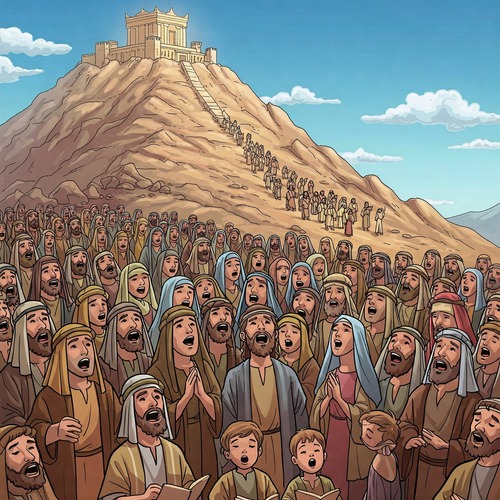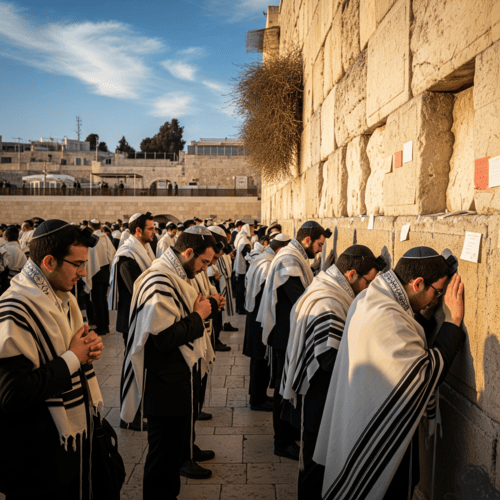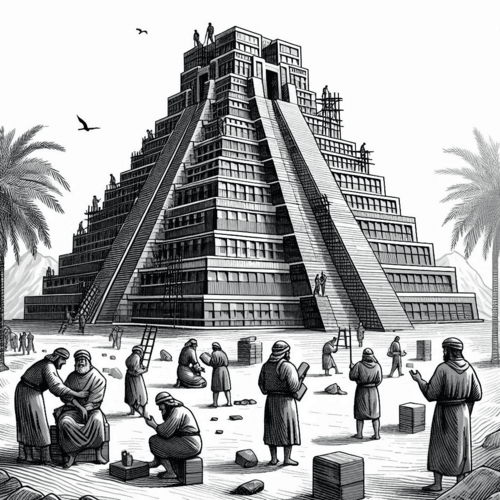Are All Jews Automatically Saved?
IF JEWS ARE GOD’S CHOSEN PEOPLE, HOW DO WE EXPLAIN JOHN 7:36
When Jesus declared to the Jewish authorities, “Where I go, you cannot come” (John 7:36), He was revealing a deep theological truth. It speaks directly to questions about God’s election and the nature of His covenant with Israel. This statement, far from contradicting the doctrine of Jewish chosenness, actually hints at how God’s sovereign election operates even within His chosen covenant community.
CORPORATE ELECTION VS INDIVIDUAL ELECTION: DISTINCT BIBLICAL CONCEPTS
Scripture indicates crucial distinctions between Israel’s corporate election as a covenant nation and God’s individual election unto salvation. When the Bible mentions the Jews as being “God’s chosen people,” it primarily refers to their unique historical role as the covenant community through whom God revealed Himself, gave His law, and ultimately brought forth the Messiah.
This corporate election bestowed tremendous privileges upon Israel. Paul enumerates these in Romans 9:4-5: “They are Israelites, and to them belong the adoption, the glory, the covenants, the giving of the law, the worship, and the promises. To them belong the patriarchs, and from their race, according to the flesh, is the Christ.” These covenant privileges were real and significant. And these made Israel distinct among all nations.
However—and this is crucial—corporate election never guaranteed individual salvation for every ethnic Israelite. Paul makes this crystal clear in the very next verse: “But it is not as though the word of God has failed. For not all who are descended from Israel belong to Israel” (Romans 9:6). Physical descent from Abraham alone does not automatically confer spiritual membership among God’s true people.
JESUS HINTS AT ELECTION WITHIN ELECTION
Jesus’ declaration in John 7:36 illustrates this principle of election within election. He was addressing Jewish religious leaders who, despite their covenant privileges, extensive knowledge of Scripture, and positions of religious authority, remained in unbelief and active opposition to God’s Messiah. Their inability to follow Christ “where He goes”—to the Father in heaven—reveals a fundamental spiritual incapacity that stems from their lack of regenerating grace.
This demonstrates what Reformed theology has long upheld: even within the covenant community of Israel, God’s eternal decree of election determines who will truly believe and be saved. The Pharisees and chief priests had every external advantage—they were circumcised, they knew the law, they offered sacrifices, they lived in anticipation of the Messiah—and yet they lacked the one thing needed—the new heart that comes only through God’s electing grace.
Jesus Himself taught this principle repeatedly. In John 8:39-44, He told these same Jewish leaders, “If you were Abraham’s children, you would be doing the works Abraham did… You are of your father the devil.” Despite their biological connection to Abraham, they lacked the faith that set their forefather apart. Similarly, in John 10:26, Jesus explained their unbelief: “You do not believe because you are not among my sheep.”
GOD’S FAITHFULNESS MAGNIFIED, NOT DIMINISHED
So was God not faithful to Israel? Far from undermining God’s faithfulness to Israel, Scripture actually magnifies it. God has kept every promise He made to the Jewish people as a nation. The land promises, the covenant of circumcision, the preservation of Israel through centuries of persecution—all demonstrate His unwavering commitment to His word.
Moreover, the Bible indicates God isn’t finished with ethnic Israel. In Romans 11:25-26, Paul reveals “a partial hardening has come upon Israel, until the fullness of the Gentiles has come in. And in this way all Israel will be saved.” This future restoration of Israel as a nation demonstrates God’s continued covenant faithfulness.
Yet the gospel reveals God’s ultimate purpose was always broader than ethnic Israel alone. His plan was to create one people from every tribe and nation—Jew and Gentile alike—united not by ethnicity or circumcision, but by faith in Christ Jesus. As Paul declares, “There is neither Jew nor Greek, there is neither slave nor free, there is neither male nor female, for you are all one in Christ Jesus” (Galatians 3:28).
THE CONTINUING SIGNIFICANCE OF JEWISH CHOSENNESS
The emphasis on Jewish chosenness remains entirely valid because it acknowledges their unique and irreplaceable role in salvation history. Through Israel came the law, the prophets, and most importantly, the Messiah Himself. As Jesus told the Samaritan woman, “Salvation is from the Jews” (John 4:22).
However, entrance into God’s eternal kingdom has always required more than ethnic identity—it has always required the new birth that comes through individual election and faith in the promised Messiah. Even in the Old Testament, the principle held true: “The righteous shall live by faith” (Habakkuk 2:4).
When Jesus told the Jewish authorities they couldn’t follow Him where He was going, He wasn’t negating their covenant privileges or God’s faithfulness to Israel. He was revealing the deeper truth that has always operated within God’s covenant community: “Many are called, but few are chosen” (Matthew 22:14). God’s election operates sovereignly and graciously, choosing individuals from every nation—including Israel—for salvation according to His eternal purposes.
ARE ALL JEWS AUTOMATICALLY SAVED? RELATED FAQs
How does Reformed theology view the “two-covenant” theory that suggests the Jews have a separate path to salvation? Reformed theology unanimously rejects dual-covenant theology, which claims Jews can be saved through the Mosaic covenant apart from Christ. John Piper argues Acts 4:12 (“there is no other name under heaven…by which we must be saved”) applies universally. RC Sproul emphasised the Old Testament saints were saved by looking forward to Christ in faith, just as New Testament believers look back to Him. The covenant of grace has always had one mediator—Jesus Christ.
- What about Romans 11:26, then, where Paul says “all Israel will be saved”? Doesn’t this suggest automatic salvation for ethnic Jews? Reformed scholars like John Murray and Douglas Moo interpret “all Israel” as referring to the fullness of elect Israel throughout history, not every individual ethnic Jew. Some, like Kim Riddlebarger, see this as the sum total of Jewish and Gentile believers (spiritual Israel), while others like John MacArthur expect a future mass conversion of ethnic Jews. However, none suggest this bypasses individual faith and regeneration—even this future salvation will come through the same gospel that saves Gentiles today.
- How does the Reformed view differ from Dispensationalism on this question? While both traditions affirm individual election, Dispensationalists typically maintain a sharper distinction between Israel and the Church, often suggesting different prophetic destinies. Reformed theology, following covenant theology, sees greater continuity—the Church is the continuation and expansion of Old Testament Israel. Progressive Dispensationalists like Craig Blaising have moved closer to Reformed positions, but traditional Dispensationalists still emphasise Israel’s unique future role more strongly than most Reformed scholars.
- How do Reformed scholars handle Old Testament passages that seem to promise unconditional salvation to all of Abraham’s descendants? Scholars like Michael Horton and Sinclair Ferguson distinguish between the conditional and unconditional aspects of God’s covenant with Abraham. The land promises and preservation of the nation were largely unconditional, but spiritual blessings were always conditioned on faith (Romans 4:16). They point to passages like Deuteronomy 30:6 about God circumcising hearts and Jeremiah 31:31-34 about the new covenant: these indicate even the Old Testament promises anticipated the need for internal spiritual transformation.
How do we address the charge that predestination makes evangelism to Jewish people pointless? Predestination actually motivates rather than undermines evangelism. Since we don’t know who the elect are, we must preach to all, trusting God to regenerate hearts through His Word. Paul himself demonstrates this in Romans 10:1—despite his strong doctrine of election, he had “great sorrow and unceasing anguish” for his unbelieving Jewish kinsmen and earnestly desired their salvation. As Martyn Lloyd-Jones emphasized, election is a comfort for believers and a motivation for evangelism, not an excuse for inaction.
ARE ALL JEWS AUTOMATICALLY SAVED? OUR RELATED POSTS
Editor's Pick

Bible Allusions: How They Enrich Our Grasp of God’s Word
Ever experienced that moment when you're reading Scripture and suddenly recognise an echo of another passage? That spark of recognition [...]

Old Testament Theophanies: What Purposes Did They Serve?
Throughout the Old Testament, we encounter remarkable moments when God manifests Himself in visible, often tangible forms to His people. [...]

When Words Fail: How the Holy Spirit Helps Us in Our Prayers
Ever sat down to pray and found yourself at a complete loss for words? Or perhaps you’ve prayed diligently but [...]

Isaiah 64:6: How Are Our Righteous Deeds Like Filthy Rags?
“We have all become like one who is unclean, and all our righteous deeds are like a polluted garment.” — [...]

The Greatest Yet the Least: How Is John the Baptist Both?
In Matthew 11:11, Jesus makes a statement that has puzzled Bible readers: “Truly I tell you, among those born of [...]

The Pilgrim’s Progress: Journeying Through the Psalms of Ascent
The Psalms of Ascent (Psalms 120-134) are a remarkable collection of fifteen songs that have guided God's people for millennia. [...]

Not Home Yet: How Scripture’s Exile Theme Shapes Our Faith
When we read Scripture carefully, a striking pattern emerges: God’s people are almost always on the move, displaced, or living [...]

At Pentecost: God Fulfils Covenant and Reverses Babel
The scene is electrifying. Jerusalem, crowded with Jewish pilgrims from across the known world. A sound like rushing wind fills [...]

The Sun’s Age: Is It Really A Showstopper for A Young Earth?
When discussing creation and the age of the earth, sceptics often point to the sun as definitive evidence against the [...]

Is the Birth Canal Poorly Designed? Creationist Perspectives
The human birth canal is a frequent example cited by evolutionists as evidence against intelligent design. They argue the narrow [...]
SUPPORT US:
Feel the Holy Spirit's gentle nudge to partner with us?
Donate Online:
Account Name: TRUTHS TO DIE FOR FOUNDATION
Account Number: 10243565459
Bank IFSC: IDFB0043391
Bank Name: IDFC FIRST BANK






